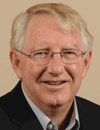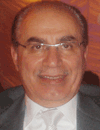Other Track AgendasCancer & Stem Cells | Cell Based Assays | Cell Culture | Circulating Tumor Cells | Flow Cytometry |

Tuesday, 22 January 201308:00 | Registration | |
Future Prospects for Cell Culture Systems |
| | 09:00 |  | Keynote Presentation Development and Scale-up of Transient Gene Expression at 300 mg/L from CHO Cells
Matthew Croughan, Professor and Director of the Amgen Bioprocessing Center at KGI, Kecks Graduate Institute, United States of America
This talk will cover new approaches that achieve titers of 300 mg/L from transient gene expression (TGE) using CHO cells. Engineering challenges unique to TGE that arise upon scale-up, including mixing and mass transport during the transfection step, are successfully addressed using scale down models and engineering analyses. |
| 10:00 | Larger Scale Bioprocessing of Human Mesenchymal Stem Cells
Christopher Hewitt, Professor, Loughborough University, United Kingdom
Here we will discuss the challenges of developing a large scale process for the expansion and separation of fully functional human mesenchymal stem cells (hMSCs) in a 5 Litre bioreactor. | 10:30 | Coffee and Networking in Exhibiton Hall | 11:15 | Organ/Tissue-specific Human Cell Systems for Development of Novel Therapies
Dieter Gruenert, Professor, University of California San Francisco, United States of America
The prospect of using human cell systems to model disease pathology has significantly enhanced the ability to develop novel patient-specific therapies. Both cell immortalization and stem cell technology have provided multiple opportunities to generate human cell systems that have features that are characteristic of specific organs/tissues and/or disease pathology. Immortalized cells can be generated to have features that reflect the parental cell of origin, while somatic cell-derived induced pluripotent stem (iPS) cells from any individual can be directed to differentiate into tissue/organ-specific precursor cells (e.g., hematopoietic, parathyroid, salivary gland, airway, thyroid, breast, etc) that have the potential of regenerating/repairing tissues damaged by disease pathology and/or therapeutic intervention (e.g., surgery, radiation, or chemotherapy). These cells can be used to evaluate therapeutic interventions in multiple tissue types in a given patient and have the potential for developing and optimizing patient specific therapies. | 11:45 | An Update on the International Community's Efforts at CHOgenome.org
Kelvin Lee, Gore Professor, University of Delaware, United States of America
We will discuss and present the latest tools and resources available at the www.CHOgenome.org resource. | 12:15 | Lunch, Poster Viewing and Networking | 13:30 | Poster Viewing Session | |
Application & Manipulation of Cultured Cells |
| | 14:45 | Process Engineering Human Pluripotent Stem Cells for Clinical Application
Paula Alves, Principle Investigator, Universidade Nova De Lisboa, Portugal
In this presentation, results concerning novel 3D culture and cryopreservation systems for hPSCs and will be presented and their advantages and applicability in the production of high quality advanced therapeutic products or functional screening tools for preclinical research discussed. | 15:15 | Coffee and Networking in Exhibiton Hall | 16:00 | Biomolecular Engineering of siRNA Therapeutics
Patrick Walton, Associate Professor, Michigan State University, United States of America
Design of the most active siRNA therapeutics against a target, remains a challenge. We will discuss recent results from our approach to mechanism based design of siRNA therapeutics, focusing on the protein-siRNA interactions that occur during silencing and the vehicles used to deliver the siRNAs to the cytoplasm. | 16:30 | Probing Cell Metabolism Using Stable Isotope Tracers and Metabolic Flux Analysis
Christian Metallo, Assistant Professor, University of California San Diego, United States of America
I will describe our work developing and applying methods to probe cell metabolism in mammalian cell cultures. These approaches employ stable isotope tracers and mass spectrometry to characterize how intracellular fluxes are regulated as a function of the microenvironment. | 17:00 | End of Day One |
Wednesday, 23 January 2013 |
Cell Line Development & Culture Strategies |
| | 08:30 |  | Keynote Presentation Cellular and Molecular Markers of Productivity in CHO Cell Culture
Mohamed Al-Rubeai, Director, University College Dublin, Ireland
We will present a comparison of the cellular, molecular and metabolic profiles of a panel of CHO cell lines expressing different levels of antibody in shaker flasks in order to provide an overview of the complexity and potential limitations in the cellular process of antibody production. |
| |
Preventing Cell Line Cross Contamination |
| | 09:30 | Mixing Issues in Cell Culture on Microcarriers with Special Reference to Stem Cells
Alvin Nienow, Professor, University of Birmingham, United Kingdom
When cells are attached to microcarriers, then damage might occur to cells from impacts or due to turbulent eddies. On the other hand, the microcarriers must be fully suspended, so it is important to minimise the specific power required for this condition. However, it must also be remembered that the specific power needs to be sufficient for other mixing related parameters. Using such considerations, we report the successful culture of mesenchymal stem cells in a 5L bioreactor. | 10:00 | Authentication of Mouse and Chinese Hamster Cell Lines
Kenneth Cole, Research Chemist, National Institute of Standards and Technology (NIST), United States of America
Two multiplex PCR assays were designed using primers that target tetranucleotide repeat regions in the mouse and Chinese hamster genomes. | 10:30 | Coffee and Networking in Exhibiton Hall | 11:15 | Authentication and Characterization of Animal Cell Lines: Impact on Research
Yvonne Reid, Manager/Scientist, American Type Culture Collection, United States of America
The use of best practices in tissue culture ensure consistent and reproducible results in cell-based assay. An overview of the current technologies used to authenticate and characterize animal cell lines will be presented.
| |
3D Cell Culture |
| | 11:45 | 3D Multicell Spheroids: A Paradigm Shifting Model System to Discover New Treatments for Cancer
Meenakshi Upreti, Assistant Professor, University of Arkansas for Medical Sciences, United States of America
A method of gravity-enforced assembly of monodispersed, colour-coded cell types in a “Hanging drop” has been developed to create multi-cell constructs that (i) replicate micro-metastatic growth by mimicking the tumor/tumor microenvironment, (ii) can be precisely size controlled, and (iii) may be implanted in animals to follow the infiltration of the various cell types and study neovascularization, metastasis, disease progression and response to treatment. | 12:15 | Lunch and Networking in Exhibition Hall | 13:30 | Poster Viewing Session | 14:15 | Fabrication of Layer-by-layer 3-D Constructs of Adherent and Non-adherent Cells in Hydrogel
Douglas Chrisey, Professor of Materials Science and Biomedical Engineering , Rensselaer Polytechnic Institute, United Kingdom
We report a protocol for the layer-by-layer fabrication of adherent and non-adherent 3-dimensional (3-D) cell cultures. The layer-by-layer, laser-based CAD/CAM fabrication process results in soft transfer and does not harm cells. The multi-layer cell culture system allows for the study the soluble factor-mediated interactions between cell layers. | 14:45 | 3D Culture Systems to Target and Characterize Complex Cellular Microenvironments
Lynne Postovit, Assistant Professor, University of Western Ontario, Canada
We will discuss 3D culture techniques designed to characterize the niche of cancer cells and stem cells and to determine the role of the microenvironment in the regulation of phenotypes such as cellular invasion and self-renewal. | 15:15 | Coffee and Networking in Exhibiton Hall | 15:45 | Advances in 3D Culture - The Art of Keeping Cells in Suspense
Anthony Mitchell Davies, Director, Trinity College Dublin, Ireland
In this presentation we will examine the novel features of a newly developed suspension cell culture system that offers demonstrable benefits in both manufacturing and research environments. | 16:15 | Better in vitro Biology: 3D Microtissues for Drug De-risking
Jan Lichtenberg, CEO and Co-Founder, InSphero AG, Switzerland
Mimicking the 3-dimensional and cell composition of a tissue in vitro is essential to maintain cell-specific functionality to better de-risk compounds and biologicals. Here we present the cellular self-assembly approach to create a tissue-like environment with applications in efficacy and safety testing. | 16:45 | Close of Conference |
|

 Add to Calendar ▼2013-01-22 00:00:002013-01-23 00:00:00Europe/LondonCell CultureSELECTBIOenquiries@selectbiosciences.com
Add to Calendar ▼2013-01-22 00:00:002013-01-23 00:00:00Europe/LondonCell CultureSELECTBIOenquiries@selectbiosciences.com